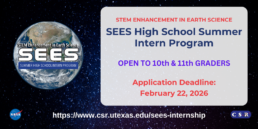STEM Enhancement in Earth Science (SEES)

NOTICE: The continuation and expansion of this program are contingent upon the availability of future funding. While current resources allow us to initiate and operate the program for the present term, sustained impact will require additional financial support.
The SEES Summer Intern Program is a nationally competitive STEM experience for high school students hosted by the University of Texas Center for Space Research. Interns collaborate with NASA, academic, and industry experts using mission data across disciplines such as aerospace, astronomy, planetary science, remote sensing, microgravity research, and space geodetic techniques. Projects are mission-based and aligned with national aerospace priorities, giving students the opportunity to build technical expertise in areas including data analysis, engineering design, and systems modeling. Through this research, interns also strengthen teamwork, communication, and professional skills critical to the nation’s future science and engineering workforce, while contributing to studies of Earth systems and natural hazards.
SEES APPLICATION DEADLINE:
FEBRUARY 22, 2026 at 8:00 pm PT
NO LATE APPLICATIONS ACCEPTED – NO EXCEPTIONS
Notifications and Staying Informed
- Notification for SEES 2026: will be emailed around May 1, 2026. Be sure to check your inbox and junk/spam folders for messages from sees@csr.utexas.edu
- Apply Online at: https://spacegrant.net/apps/sees
- Stay Updated: Sign up to receive updates about the SEES application window and deadlines at: https://bit.ly/3DeRMwL
Helpful Tip: To ensure you receive important updates, add sees@csr.utexas.edu to your email contacts or approved senders list.
Important Dates to Remember
| February 22 | Applications Due |
| March 1 | Recommendation Forms Due |
| May 1 | Approximate Date of Notifications |
| May 15-July 1 | Earth and Space Distance Learning Module Available |
| May 15-July 1 | Python Distance Learning Module Available (notification provided if project requires, otherwise optional) |
| June | SEES Speaker Series (Tuesdays and Thursdays) |
| July 1 | Earth and Space Science/Python Modules Due (at 8:00 PM PT – No Exceptions) |
| June-July 3 | Project Specific Online Work with Project Mentors. (Mentor will reach out to students regarding date & times project will meet.) |
| July 5-18 | On-site Projects for SEES Interns at UT |
| July 18 | All SEES Interns on-site return home |
| June-July 21 | Virtual Projects unless notified by project regarding additional dates |
| July 20-21 | SEES Virtual Science Symposium |
This summer UT/CSR will support a summer intern program where interns will complete distance learning modules prior to July 1 and work remotely June – July 3, guided by project mentors. The on-site internship will be July 5 – July 18, 2026. On-site interns return home on July 18. Housing, meals, and local transportation will be provided for those selected for scholarship and those fee-based students selected to attend. A limited number of travel scholarships to Texas may be available. Virtual internships vary by project and timelines are listed in the project description. All project teams will present their research during the Virtual SEES Science Symposium July 20-21, 2026.
Summer internships are offered to motivated high school students who have an interest in pursuing Science, Technology, Engineering, or Mathematics careers. The interns will work beside NASA and other aerospace subject matter experts analyzing and visualizing data. Through a combination of scientific knowledge and hands-on experiences, interns engage in authentic NASA research through field investigations and data analysis. They also strengthen systems design thinking, collaboration, and communication, while developing the technical skills required to succeed in multiple career pathways, from skilled trades to advanced research and engineering.
Interns are selected on the basis of their academic records, written application that includes answers to essay questions, introduction video, recommendation form, and interest in STEM. The deadline for submitting your application for the summer 2026 internship program is February 22, 2026.
Here’s what former interns had to say:
The SEES High School Summer Intern Program is funded through NASA Cooperative Agreement Notice NNH15ZDA004C and is a part of NASA’s Science Activation program. For more information, go to: https://science.nasa.gov/learners